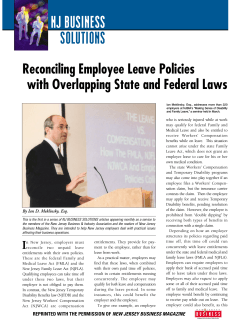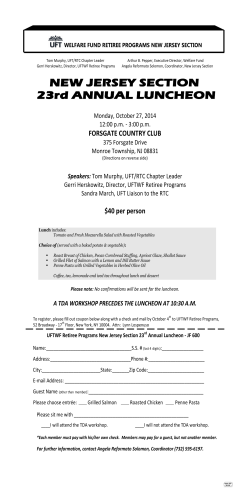
New Jersey Future Request for Proposals
October 17, 2014 New Jersey Future Request for Proposals New Jersey Combined Sewer Overflow Long Term Control Plan Best Practices Scope of Work: New Jersey Future seeks to secure consulting expertise regarding best practices for combined sewer overflow (CSO) Long Term Control Plans (LTCPs), including forming the LTCP planning team. Deadline for proposals: October 31, 2014. INTRODUCTION An Opportunity to Turn Regulatory Compliance into Community-wide Transformation Twenty-one municipalities and eight wastewater treatment plants in New Jersey are about to launch a multidecade, multi-billion-dollar effort to upgrade their water infrastructure. In January 2015 they will receive final New Jersey Pollution Discharge Elimination System (NJPDES) permits from the New Jersey Department of Environmental Protection (NJDEP) – permits that require the preparation of Long Term Control Plans to control combined sewer overflows (CSOs). The required investment in water infrastructure has the potential to make the host communities more healthy, sustainable and equitable. New approaches to CSO solutions employ green infrastructure, best practices and state-of-the-art technologies that reduce costs and create local jobs; enhance resilience; integrate water infrastructure upgrades with city redevelopment, parks and transportation; and engage residents and businesses. Unfortunately, most permittees are ill-equipped to understand this opportunity: they are small and cash-strapped and have limited staff capacity, and they and their elected leaders face a multitude of urban challenges. A Key Milestone – Forming the Long Term Control Plan (LTCP) Team and Defining Its Scope of Work New Jersey Future, along with its partner, the Geraldine R. Dodge Foundation, has highlighted the issue through its Ripple Effects report , and has engaged a diverse body of stakeholders to pursue solutions. This group has published a shared Agenda for Change to guide its efforts. As part of this process, a committee has been formed to aid in the process of LTCP development. Among other tasks, the committee seeks to promote best practices in the development of requests for proposals (RFPs) that permittees will use to hire consultants to write the LTCPs, and for selection of the team of consultants and/or staff. The committee is co-chaired by Bridget McKenna (chief operating officer at Passaic Valley Sewerage Commission) and Rob Pirani (Director of the NY – NJ Harbor & Estuary Program), and supported by New Jersey Future. October 17, 2014 The Need for a Consultant To Advise and Support the Committee The committee seeks a consultant to provide strategic advice and produce the deliverables listed below. The consultant should have a track record of experience with CSO Long Term Control Plans, from the perspective of either the regulator, the permittee or a consultant. The consultant should have experience with LTCPs that integrate green-infrastructure approaches and other innovations. Firms affiliated with a New Jersey CSO permittee or that might work for a CSO permittee in New Jersey are eligible, but any current or anticipated relationship must be disclosed. The consultant should be available immediately in order to meet anticipated product deadlines noted below. SCOPE OF WORK Deliverables The consultant will produce by January 2, 2015, an annotated model RFP, white paper, and summary Powerpoint presentation that will help guide permittees on how Long Term Control Plans can go beyond meeting federal and state requirements to integrating best practices that produce multiple benefits. The documents must: 1) 2) 3) 4) 5) Identify best practices such as integrated planning; system optimization; asset management; water conservation; innovative green- and gray-infrastructure approaches; strategic greeninfrastructure opportunities analysis; robust public participation; coordination across city departments, including planning, transportation and parks, and among neighboring cities; and benefit –cost analysis. Consultants should draw from the Agenda for Change, appropriate practices promoted by the USEPA and NJDEP, and successful CSO control approaches from across the country. Each best practice should be included in the model RFP as an alternative for which a consultant could provide a separate cost, and should discuss the benefits likely to accrue to a community as a result of its use. The best practices and range of accompanying benefits should also be described briefly in the white paper. Recommend the specific ways that local elected and appointed officials and staff should be engaged in development of the LTCP, to ensure that local conditions are clearly represented and those local officials and staff understand and support the recommended CSO solutions, in order to lay the groundwork for implementation. Identify aspects of the LTCP where costs can be saved through regional approaches. For example, some aspects of a System Characterization Report can be performed more efficiently by a single consultant working in multiple municipalities. (Note that the NJDEP encourages all of the permittees served by a common treatment plant to work together to develop joint LTCPs, but a joint LTCP will also need to include components that reflect in-depth understanding of, and integration with, individual municipalities’ needs and opportunities as described in (2) above.) Explain the options of creating a LTCP team using in-house staff, outside consultants, or a combination, and the pros and cons of each approach. Include criteria for the selection of consultants, which should include demonstration of experience with LTCPs from elsewhere in the country, as well as experience in comprehensive green-infrastructure approaches. October 17, 2014 Schedule 1. Deadline for questions about this RFP: Thursday, October 23, 5:00 p.m. New Jersey Future will post all answers at http://www.njfuture.org/rfpquestions by Monday, October 27, 9:00 a.m. 2. Deadline for receipt of proposals: October 31, 5:00 p.m. 3. Consultant notified of selection: November 6. 4. Presentation by consultant to the committee of draft work plan, and discussion via conference call, on or about November 12. 5. Submission of draft RFP and white paper by December 3. 6. Presentation to the committee and discussion of committee comments, via conference call, on or about December 10. 7. Submission of revised final RFP, white paper and Powerpoint presentation by January 2, 2015. 8. Presentation to a public conference on or about January 8. SUBMISSION REQUIREMENTS Questions: Please contact Chris Sturm with any questions or requests for more information. Responses to all questions will be provided to all firms who have requested this RFP. Proposal specifications: All proposals should include: A basic statement of qualifications, including experience, background, skills and degree of expertise in the specific areas outlined in this RFP. Firms affiliated with a New Jersey CSO permittee or with a consulting firm that might work for a CSO permittee in New Jersey are eligible, but any current or anticipated relationship must be disclosed. At least two references, for relevant experience in the development of CSO LTCPs that included both green- and gray-infrastructure components. Financial proposal for the project, not to exceed $10,000, including total work hours and hourly rate schedule to perform this work. Any other relevant contractual language. The successful firm’s final proposal will become part of any signed agreement. The proposal shall be submitted, via email, to Chris Sturm, New Jersey Future, by October 31, 2014, at 5:00 p.m. This request for proposals does not commit New Jersey Future to engaging the services of any firm for any of the items either within or outside the outlined scope of work. INFORMATION RESOURCES Ripple Effects, a New Jersey Future report on New Jersey’s municipalities with combined sewer systems and the extent of the problem with CSOs in those cities. Agenda for Change for New Jersey’s urban water infrastructure. Website of NJDEP CSO Permit Program. NJDEP guidance on asset management.
© Copyright 2025













